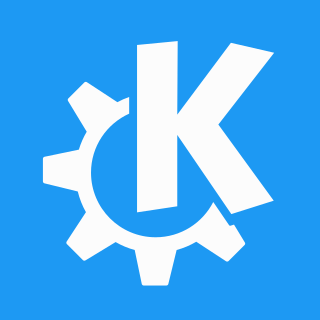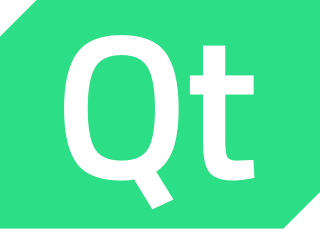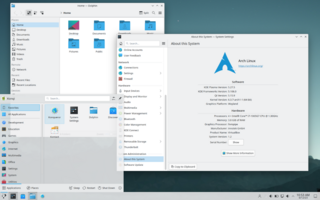Related Research Articles

KDE is an international free software community that develops free and open-source software. As a central development hub, it provides tools and resources that allow collaborative work on this kind of software. Well-known products include the Plasma Desktop, KDE Frameworks, and a range of cross-platform applications such as Amarok, digiKam, and Krita that are designed to run on Unix and Unix-like operating systems, Microsoft Windows, and Android.

Qt is cross-platform software for creating graphical user interfaces as well as cross-platform applications that run on various software and hardware platforms such as Linux, Windows, macOS, Android or embedded systems with little or no change in the underlying codebase while still being a native application with native capabilities and speed.
The Qt Company is a software company based in Espoo, Finland. It oversees the development of its Qt application framework within the Qt Project. It was formed following the acquisition of Qt by Digia, but was later spun off into a separate, publicly traded company.

Gambas is the name of an object-oriented dialect of the BASIC programming language, as well as the integrated development environment that accompanies it. Designed to run on Linux and other Unix-like computer operating systems, its name is a recursive acronym for Gambas Almost Means Basic. Gambas is also the word for prawns in the Spanish, French, and Portuguese languages, from which the project's logos are derived.

Kubuntu is an official flavor of the Ubuntu operating system that uses the KDE Plasma Desktop instead of the GNOME desktop environment. As part of the Ubuntu project, Kubuntu uses the same underlying systems. Kubuntu shares the same repositories as Ubuntu and is released regularly on the same schedule as Ubuntu.

Maemo is a software platform originally developed by Nokia, now developed by the community, for smartphones and Internet tablets. The platform comprises both the Maemo operating system and SDK. Maemo played a key role in Nokia's strategy to compete with Apple and Android, and that strategy failed for complex, institutional and strategic reasons.

Qt Creator is a cross-platform C++, JavaScript, Python and QML integrated development environment (IDE) which simplifies GUI application development. It is part of the SDK for the Qt GUI application development framework and uses the Qt API, which encapsulates host OS GUI function calls. It includes a visual debugger and an integrated WYSIWYG GUI layout and forms designer. The editor has features such as syntax highlighting and autocompletion. Qt Creator uses the C++ compiler from the GNU Compiler Collection on Linux. On Windows it can use MinGW or MSVC with the default install and can also use Microsoft Console Debugger when compiled from source code. Clang is also supported.

Lubuntu is a lightweight Linux distribution based on Ubuntu and uses the LXQt desktop environment in place of Ubuntu's GNOME desktop. Lubuntu was originally touted as being "lighter, less resource hungry and more energy-efficient", but now aims to be "a functional yet modular distribution focused on getting out of the way and letting users use their computer".

PySide is a Python binding of the cross-platform GUI toolkit Qt developed by The Qt Company, as part of the Qt for Python project. It is one of the alternatives to the standard library package Tkinter. Like Qt, PySide is free software. PySide supports Linux/X11, macOS, and Microsoft Windows. The project can also be cross compiled to embedded systems like Raspberry Pi, and Android devices.

rekonq was a lightweight, QtWebKit-based web browser developed inside the free software project KDE. It is the default web browser of Chakra GNU/Linux, and was formerly of Kubuntu. rekonq has been officially included in KDE Extragear since 25 May 2010. In contrast to Konqueror, a web browser and file manager also developed by KDE, rekonq aims to be a standalone and simple web browser. Its code was initially based on Qt Development Frameworks' QtDemoBrowser and is developed on KDE Projects' Git repository.

LightDM is a free and open-source X display manager that aims to be lightweight, fast, extensible and multi-desktop. It can use various front-ends to draw the user interface, also called Greeters. It also supports Wayland.

Mer was a free and open-source software distribution, targeted at hardware vendors to serve as a middleware for Linux kernel-based mobile-oriented operating systems. It is a fork of MeeGo.
Falkon is a free and open-source web browser developed by KDE. It is built on the QtWebEngine, which is a wrapper for the Chromium browser core.

Maliit is an input method framework for computers with particular focus on implementing virtual keyboards. Designed mostly for touchscreen devices, Maliit allows the inputting of text without the presence of a physical keyboard. More advanced features such as word correction and prediction are also available.
The Qt Project is an open collaboration effort to coordinate the development of the Qt software framework. Initially founded by Nokia in 2011, the project is now led by The Qt Company.

KDE Plasma 5 is the fifth and current generation of the graphical workspaces environment created by KDE primarily for Linux systems. KDE Plasma 5 is the successor of KDE Plasma 4 and was first released on 15 July 2014.

The KDE Gear is a set of applications and supporting libraries that are developed by the KDE community, primarily used on Linux-based operating systems but mostly multiplatform, and released on a common release schedule.

KDE neon is a Linux distribution developed by KDE based on Ubuntu long-term support (LTS) releases, bundled with a set of additional software repositories containing the latest versions of the Plasma 5 desktop environment/framework, Qt 5 toolkit and other compatible KDE software. First announced in June 2016 by Kubuntu founder Jonathan Riddell following his departure from Canonical Ltd., it has been adopted by a steadily growing number of Linux users, regularly appearing in the Top 20 on DistroWatch.com's popularity tables.

MX Linux is a Linux distribution based on Debian stable and using core antiX components, with additional software created or packaged by the MX community. The development of MX Linux is a collaborative effort between the antiX and former MEPIS communities. The MX 'name' comes from the M for MEPIS and the X from antiX – an acknowledgment of their roots. The community's stated goal is to produce "a family of operating systems that are designed to combine elegant and efficient desktops with high stability and solid performance".
References
- ↑ "Qt 6.6 released!".
- 1 2 Tuukka Turunen (18 December 2015). "Introducing Long Term Support". Qt Project . Retrieved 28 March 2016.
- 1 2 3 "Extended lifetime for Qt 5.15". www.qt.io. Retrieved 2022-05-19.
- ↑ Leppälä, Kimmo (7 June 2017). "Renewed Qt Support Services". Qt Project. Retrieved 8 June 2017.
- 1 2 "Qt5PatchCollection". KDE Community Wiki.
- ↑ "Qt offering changes 2020". www.qt.io. Retrieved 2021-07-03.
- ↑ "Offline Qt Downloads".
- ↑ "Beta of Motif-like C++ library available". groups.google.com. Retrieved 14 November 2022.
- ↑ "Happy 20th Anniversary Qt!". Qt Blog.
- ↑ "Qt framework celebrates its 20th anniversary". SD Times. 21 May 2015.
- ↑ "BETA: Qt 0.92 for linux (C++ GUI toolkit)". groups.google.com. Retrieved 23 August 2023.
- ↑ "Qt 0.93 for linux (C++ GUI framework)". groups.google.com. Retrieved 23 August 2023.
- ↑ "Qt 0.95 for linux (C++ GUI framework)". groups.google.com. Retrieved 23 August 2023.
- 1 2 3 4 5 6 7 8 9 "History of Cute Qt".
- ↑ "Qt 0.98 - object-oriented C++ framework for GUI apps". groups.google.com. Retrieved 23 August 2023.
- 1 2 3 "Qt History". Qt Wiki.
- ↑ "Qt 4.8.7 Released - Qt Blog". Qt Blog. 2015-05-26. Retrieved 2017-11-03.
- ↑ "Trolltech Releases Qt 4.1". qt.nokia.com. Archived from the original on 18 August 2009. Retrieved 27 November 2011.
- ↑ Harald Fernengel, labs.qt.nokia.com. "Qt 4.2.0 released". Archived from the original on 6 July 2011. Retrieved 27 November 2011.
- ↑ Girish Ramakrishnan, labs.qt.nokia.com. "Qt 4.3.0 released". Archived from the original on 5 March 2012. Retrieved 27 November 2011.
- ↑ "What's New in Qt 4.3". 26 April 2008. Archived from the original on 2008-04-26.
- ↑ Thiago Macieira, labs.qt.nokia.com. "Qt 4.4.0 fully released". Archived from the original on 23 November 2011. Retrieved 27 November 2011.
- ↑ Jason McDonald. "Qt 4.5 hits the (virtual) shelves". labs.qt.nokia.com. Archived from the original on 13 April 2012. Retrieved 27 November 2011.
- ↑ Jason McDonald. "Qt 4.6.0 Released Early due to Good Behaviour". labs.qt.nokia.com. Archived from the original on 17 September 2011. Retrieved 27 November 2011.
- ↑ Jason McDonald. "Qt 4.7.0 now available". labs.qt.nokia.com. Archived from the original on 22 January 2012. Retrieved 27 November 2011.
- ↑ Sinan Tanilkan. "Qt 4.8.0 Released". labs.qt.nokia.com. Archived from the original on 16 December 2011. Retrieved 15 December 2011.
- ↑ Thiago Macieira (7 October 2011). "Concern about removal of QWidget classes". Qt5-feedback (Mailing list). Archived from the original on 21 September 2013. Retrieved 3 July 2013.
- ↑ Lars Knoll (9 May 2011). "Thoughts about Qt 5". Digia. Retrieved 9 May 2011.
- ↑ Lars Knoll (21 October 2011). "The Qt Project is live!". Nokia . Retrieved 8 February 2012.
- ↑ Qt Blog. "Introducing Qt 5.0". Digia. Retrieved 19 March 2013.
- ↑ "New Features in Qt 5.1". Digia. 3 July 2013. Retrieved 3 July 2013.
- ↑ Lars Knoll (20 May 2014). "Qt 5.3 Released". blog.qt.io. Retrieved 2015-02-26.
- ↑ "Qt 5.4 Alpha Available". Digia. 9 September 2014. Retrieved 8 September 2014.
- ↑ Jani Heikkinen (17 March 2015). "New Features in Qt 5.5". Qt Project . Retrieved 31 March 2015.
- ↑ "New Features in Qt 5.6". Qt Project. 25 March 2015. Retrieved 28 March 2016.
- ↑ "New Features in Qt 5.7". Qt Wiki.
- ↑ "Qt 3D Overview".
- 1 2 Lars Knoll (23 January 2017). "Qt 5.8 released". Qt Blog.
- ↑ "New Features in Qt 5.8". Qt Project . Retrieved 2 May 2017.
- 1 2 Lars Knoll (31 May 2017). "Qt 5.9 released". Qt Blog.
- ↑ "New Features in Qt 5.9". Qt Project . Retrieved 1 June 2017.
- ↑ Lars Knoll (7 December 2017). "Qt 5.10 released". Qt Blog.
- ↑ "New Features in Qt 5.10". Qt Project . Retrieved 14 February 2018.
- ↑ Lars Knoll (22 May 2018). "Qt 5.11 released". Qt Blog.
- 1 2 "New Features in Qt 5.11". Qt Project . Retrieved 22 May 2018.
- ↑ "Qt 5.11.2 Released with ~800 Changes, 250+ Bug Fixes - Phoronix".
- ↑ "The new Qt Quick Compiler technology". www.qt.io. Retrieved 2023-03-12.
- ↑ "Qt 5.12 Release - Qt Wiki".
- ↑ "New Features in Qt 5.12". Qt Project . Retrieved 1 March 2019.
- ↑ "Qt 5.13 Released! Get it today".
- 1 2 "Supported Platforms - Supported Qt Versions".
- ↑ "Qt 5.13.0 Known Issues - Qt Wiki".
- ↑ "Qt 5.14 released!".
- 1 2 3 4 Tuukka Turunen (4 January 2021). "[Development] Commercial-only LTS phase starts: Closing the 5.15 branch(es) on 5th January" . Retrieved 4 January 2021.
- 1 2 "Qt 5.15 LTS Released | Software Development Tools | Qt".
- ↑ Andy Shaw (13 May 2020). "Qt 5.9 LTS – End of Life (page 7 and 11)" (PDF).
- ↑ "libqt5-qtbase". openSUSE Build Service.
- ↑ "Qt 6.0 Released". www.qt.io. Retrieved 2020-09-28.
- ↑ "Qt 6.0.4 Released". www.qt.io. Retrieved 2021-05-04.
- 1 2 3 "Qt 6.0 Released".
- ↑ "Qt 6.1.3 Released". www.qt.io. Retrieved 2021-09-01.
- ↑ "Qt 6.1 Released".
- ↑ "Commercial LTS Qt 6.2.10 Released". www.qt.io. Retrieved 2023-11-29.
- 1 2 "Qt 6.2 LTS Released".
- ↑ "Qt 6.3.2 Released". www.qt.io. Retrieved 2022-09-12.
- 1 2 3 4 5 "Qt 6.3 Released".
- ↑ "Qt 6.4.3 Released". www.qt.io. Retrieved 2023-03-16.
- 1 2 3 "Qt 6.4 Released".
- ↑ "Qt 6.5.3 Released". www.qt.io. Retrieved 2023-09-28.
- ↑ "Qt 5.15 vs 6.5 feature comparison". www.qt.io. Retrieved 2023-04-05.
- ↑ "Qt 6.6 Released". www.qt.io. Retrieved 2023-10-10.
- ↑ "KDE Project releases KDE 1 !". 14 October 2016. Archived from the original on 27 October 2016.